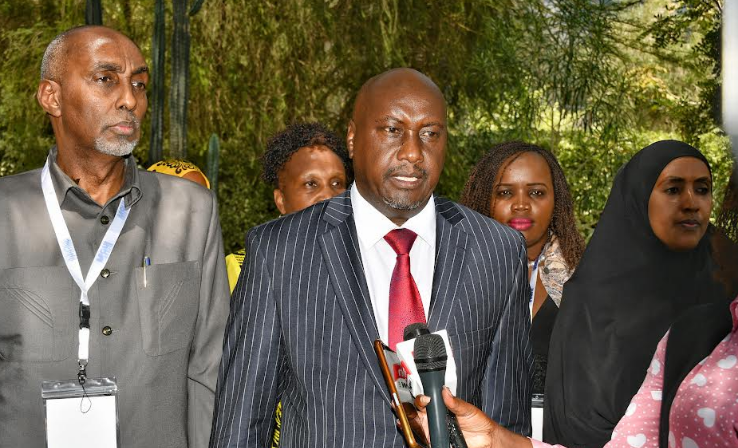The number of employees in the Public Service suffering from mental illness continue to rise despite measures that have been put in place to contain mental illness in the workplace.
State Department for Public Service Principal Secretary (PS) Amos Njoroge Gathecha has revealed that the number of civil servants suffering from mental health issues has tripled to over 14,000 in 2023, down from 4,000 mental cases before 2020 when the COVID-19 pandemic set in.
To this end, the PS announced that they have set up counselling centres in every Huduma centre in the country to help those who need psychological help and revealed that those who need tele-counselling can dial 1919, and he or she will be connected to a counsellor who will be waiting to help them.
Data from the State Department of Public Service shows the country lost Sh 62.2 billion due to mental health conditions, which is equivalent to 0.6 per cent of our Gross Domestic Product (GDP) in 2020 after the onset of the Covid-19 pandemic.
The PS was speaking when he officially opened the 28th Annual national Human Resource Management (HRM) conference organized by the Institute of Human Resource Management (IHRM) in Naivasha on Wednesday. This year’s theme is “HR Visionaries: Transforming Workplaces, Empowering Africa”.
Gathecha said the State Department for Public Service, in consultation with the Social Health Authority (SHA), extended the contract for the provisions of the comprehensive medical insurance scheme for Civil Servants up to November 21st, 2024, to facilitate seamless transition and effective service delivery to the scheme beneficiaries.
He said a team has been constituted to put in place appropriate mechanisms so that civil servants continue to enjoy medical services and group life cover, as was the case in the now disbanded National Health Insurance Fund (NHIF). In the meantime, Gathecha urged all citizens to register under the new Social Health Insurance Fund.
The PS reiterated that the government is committed to building a Public Service that is strategic, with foresight mechanisms for anticipating change; developing highly skilled, agile, and responsive service; digitalising services; and strengthening human capital approaches consistent with merit system principles, including modernising policies and practices for recruitment, retention, training, and development.
Consequently, he noted initiatives that have been undertaken in the recent past to transform the work place in the Public Service include development of the Human Resource Information System Kenya (HRIS- Ke), in this year, which is a web-based system that has been developed and will manage human resource functions in the public sector, including payroll.
Gathecha explained that the system will enable the allocation of a Unique Payroll Number (UPN) to all public officers under the Payroll Management Policy for the Public Service. The policy is meant to provide an overarching framework to standardise and harmonise Payroll Management in the public service. Ministries and Departments migrated their payrolls to the System in July 2024. All other Agencies are expected to migrate to the system by June, 2025.
“Training on the new system has been undertaken for payroll managers from Ministries, Departments, County Governments and State Corporations to ensure staff gain the necessary skills and competencies for implementation. Payroll managers from public universities are currently undergoing training on the same. As Directors and Managers of HR in the Public Service, you need to ensure compliance with this new system,” he stated.
Another initiative that has been put in place is managing a diverse workforce with generational differences, which poses a number of challenges at the workplace. To this end, the Government has developed and mainstreamed various policies and strategies, such as Diversity Policy for the Public Service, Dignity at Work Policy for the Public Service, Gender Mainstreaming Policy, and HIV and AIDS Policy at the Workplace, among others, to enhance inclusivity.
Gathecha also observed that the government continues to leverage on technology for improved service delivery through the introduction of interventions such as virtual meetings, e-learning, teleconferencing, and e-communication, including the Huduma Kenya Service Delivery Programme, in a bid to improve efficiency.
In managing the diverse workforce, the PS said the Government has developed and mainstreamed various policies and strategies, such as Diversity Policy for the Public Service, Dignity at Work Policy for the Public Service, Gender Mainstreaming Policy, and HIV and AIDS Policy at the Workplace, among others, to enhance inclusivity.
“The Government continues to leverage on technology for improved service delivery through the introduction of interventions such as virtual meetings, e-learning, teleconferencing, and e-communication, including the Huduma Kenya Service Delivery Programme. This is a platform that offers one-stop service delivery points where customers,” Gathecha said, adding that the reforms the government is implementing represent transformative initiatives of the public service to improve the workplace through accelerating digital transformation, expanding capacity-building programs, enhancing service delivery mechanisms, and promoting work-life integration initiatives.
“I therefore call upon HR professionals to embrace creativity, professionalism and integrity, transparency, accountability, and good governance practices through our individual and collective effort of transforming workplaces for better economic development.”
The PS noted that to transform the workplace is a call that requires HR practitioners as members of IHRM to stick and adhere to the HRMP Act, 2012, and the Professional Code of Conduct; hence, the importance of professional bodies cannot be overemphasised.
Ethics and Anti-Corruption Commission (EACC) Deputy Chief Executive (CEO) Mr. Abdi Mohammed on his part revealed that they have come up with a new syllabus to train professionals on Ethics and Corruption, adding that this was after EACC realised that many corruption and anti-ethical issues are perpetuated by professionals.
He said they were already working with four professional bodies to train their members on the syllabus that will start in March at the Kenya School of Government (KSG).
By Mabel Keya Shikuku





